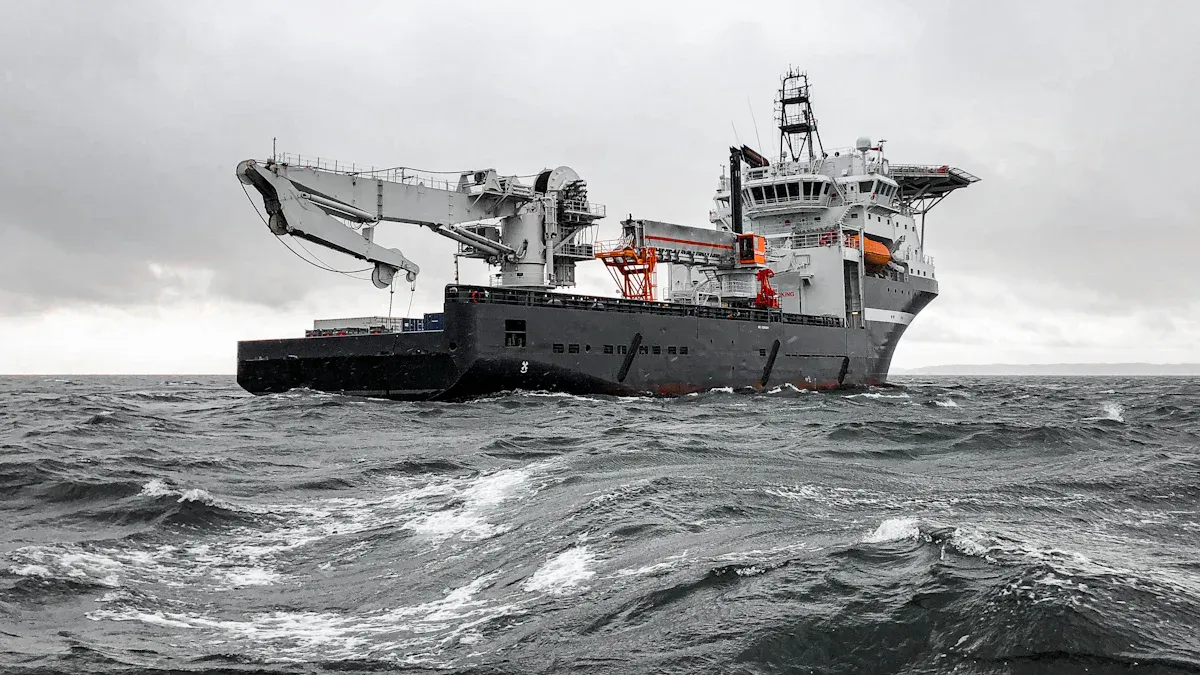
Forged generator shafts play a critical role in the shipbuilding and offshore industries, where performance and reliability are non-negotiable. Their robust construction ensures they withstand extreme conditions, making them indispensable for demanding maritime applications.
- Components in propulsion systems using seamless rolled ring forging experience a service life increase of over 40%.
- Seamless rolled ring forgings account for more than 50% of ship propulsion systems and over 30% of structural parts.
These statistics underscore why FORGINGS FOR THE MARITIME & OFF-SHORE INDUSTRY remain a cornerstone of modern engineering, delivering unmatched durability and efficiency.
Key Takeaways
- Forged generator shafts are very strong and long-lasting, perfect for ships and offshore work.
- These shafts do not rust easily and work well in tough sea conditions, lowering the chance of breaking.
- Using forged parts can save money on repairs and make ship systems last longer.
- Forged shafts are stronger and handle stress better than cast or machined ones.
- Buying good forgings helps ships work safely and efficiently in hard sea environments.
Unique Properties of Forged Generator Shafts
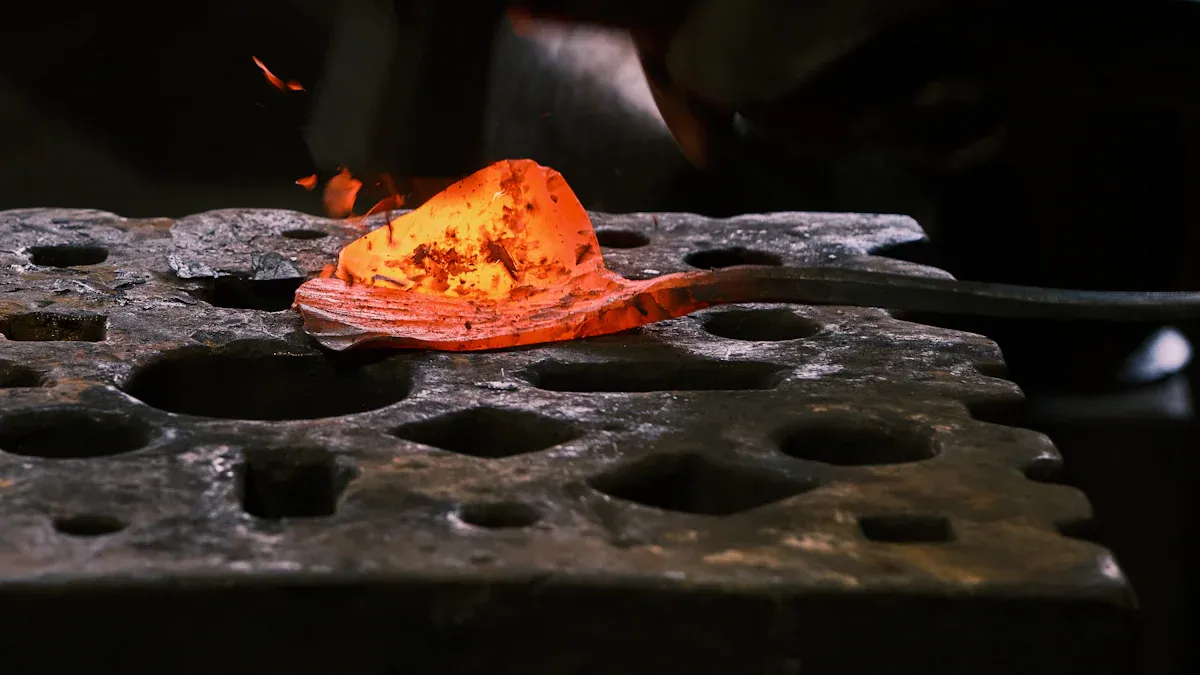
Exceptional Strength and Durability
Forged generator shafts exhibit unparalleled strength due to their manufacturing process. The open die forging method compresses and refines the metal’s grain structure, eliminating internal voids and defects. This results in components that can endure heavy loads and resist deformation over time. Industries like shipbuilding rely on this strength to ensure propulsion systems operate efficiently under demanding conditions.
Tip: The durability of forged components reduces maintenance costs and extends the service life of critical systems.
Rongli Forging Co., Ltd utilizes advanced equipment, including a 7000-ton hydraulic press, to produce generator shafts with exceptional mechanical properties. These shafts meet stringent industry standards, making them ideal for applications in FORGINGS FOR THE MARITIME & OFF-SHORE INDUSTRY.
Resistance to Corrosion and Harsh Environments
Marine environments expose components to saltwater, humidity, and fluctuating temperatures. Forged generator shafts resist corrosion due to their dense and uniform structure. Materials like stainless steel and alloy steel further enhance this resistance, ensuring reliable performance in offshore applications.
Shipbuilding and offshore industries benefit from this property, as it minimizes the risk of component failure in critical systems. Rongli’s expertise in tailoring forgings to meet specific environmental challenges ensures that their products excel in FORGINGS FOR THE MARITIME & OFF-SHORE INDUSTRY.
Enhanced Performance Under High Stress and Load Conditions
Forged generator shafts deliver consistent performance under extreme stress and load conditions. Their refined grain structure distributes stress evenly, reducing the likelihood of fractures or fatigue. This makes them indispensable for power generation and propulsion systems in ships and offshore platforms.
Rongli’s open die forging process allows for customization of mechanical properties, ensuring each shaft meets the unique demands of its application. This adaptability reinforces their role in FORGINGS FOR THE MARITIME & OFF-SHORE INDUSTRY, where reliability is paramount.
FORGINGS FOR THE MARITIME & OFF-SHORE INDUSTRY: Applications in Shipbuilding
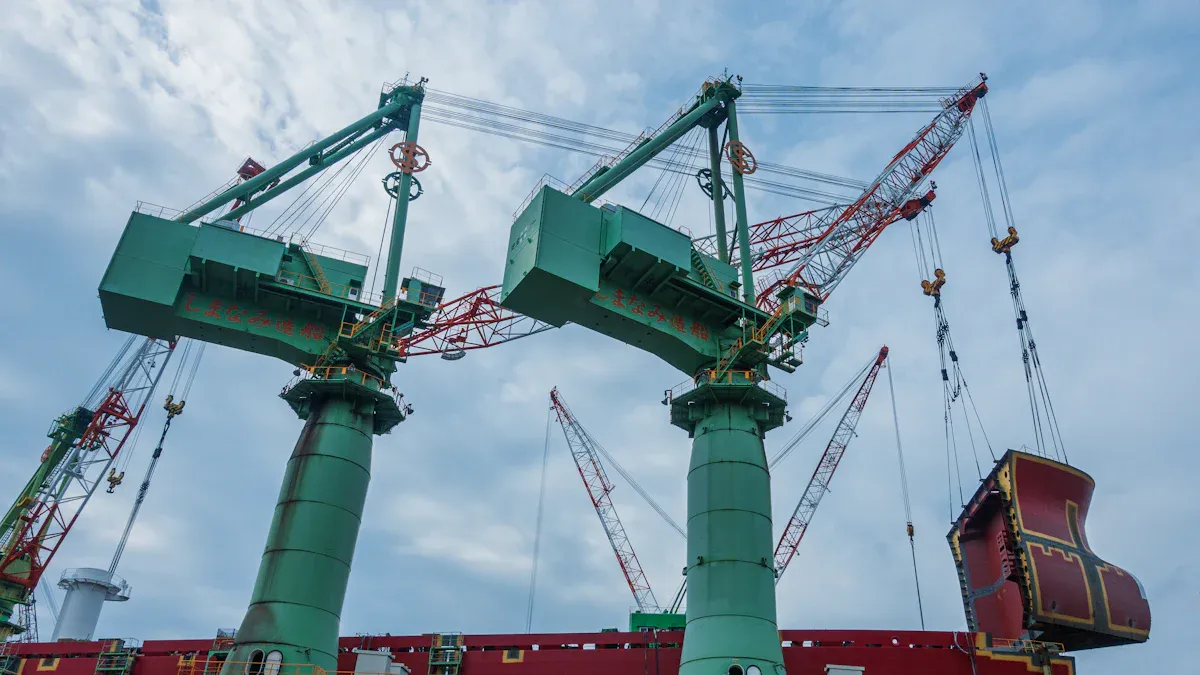
Role in Propulsion Systems
Forged generator shafts play a pivotal role in ship propulsion systems. These components, including propeller shafts and intermediate shafts, endure immense torque and bending loads during operation. The seamless rolled ring forging process enhances their strength and durability, ensuring reliable performance under such demanding conditions. For instance, propeller shafts manufactured using this method have demonstrated a service life increase of over 40%. This improvement reduces maintenance costs and minimizes downtime, making them indispensable for modern shipbuilding.
The shipbuilding industry relies heavily on forgings for propulsion systems. Over 50% of propulsion system components are produced using seamless rolled ring forgings. This widespread adoption highlights their importance in ensuring the efficiency and longevity of maritime drives.
Importance in Energy Generation and Power Transmission
Forged generator shafts are essential for energy generation and power transmission in ships. These shafts transfer mechanical energy from the engine to the propulsion system, ensuring smooth and efficient operation. Their refined grain structure and exceptional mechanical properties allow them to handle high stress and load conditions without compromising performance.
In addition to propulsion, these shafts support auxiliary systems such as onboard power generators. Their ability to withstand harsh marine environments ensures uninterrupted energy supply, which is critical for the safety and functionality of the vessel. Rongli Forging Co., Ltd specializes in producing generator shafts tailored to meet these rigorous demands, reinforcing their role in energy transmission systems.
Contribution to Overall Ship Reliability and Longevity
The use of forged generator shafts significantly enhances the reliability and lifespan of ships. Their superior strength and resistance to fatigue reduce the likelihood of component failure, even under extreme conditions. This reliability translates to fewer repairs and lower operational costs over the vessel’s lifetime.
By incorporating high-quality forgings into critical systems, shipbuilders ensure that their vessels can withstand the challenges of marine environments. The durability and performance of these components contribute to the overall safety and efficiency of maritime operations, solidifying their importance in the shipbuilding industry.
FORGINGS FOR THE MARITIME & OFF-SHORE INDUSTRY: Importance in Offshore Use
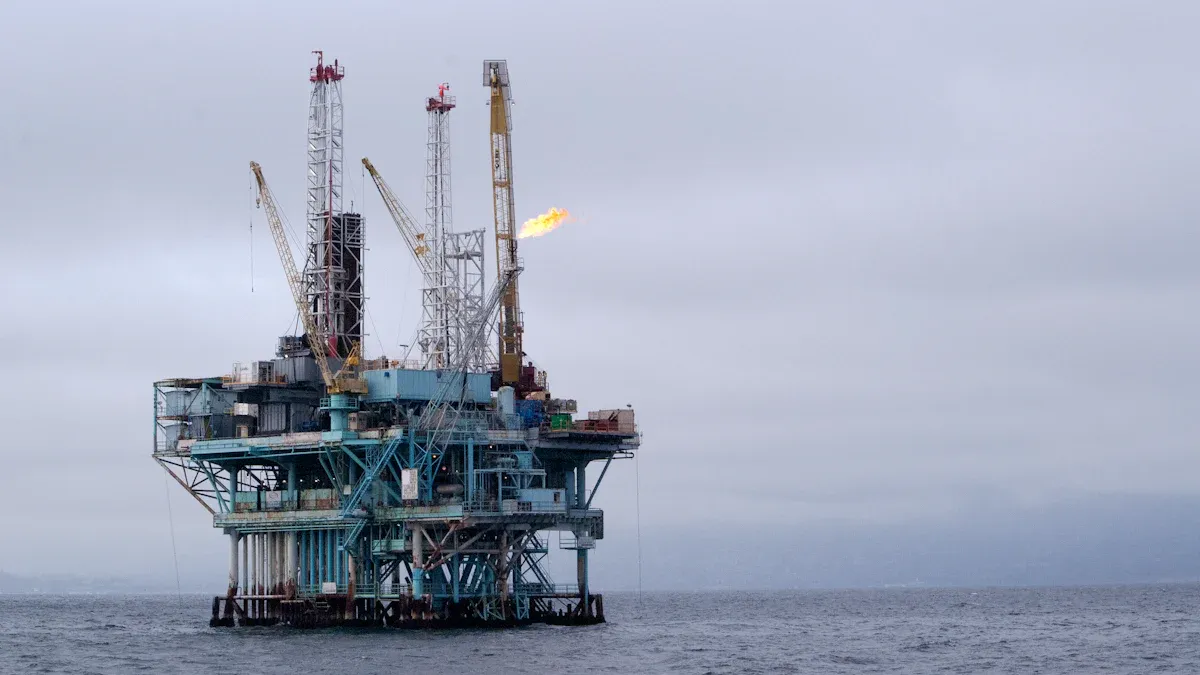
Reliability in Oil and Gas Platforms
Forged generator shafts are critical for the reliability of oil and gas platforms. These platforms operate in some of the harshest environments, where equipment must endure constant exposure to saltwater, high pressure, and extreme temperatures. Forged components, with their refined grain structure and superior mechanical properties, provide the strength and durability needed to withstand these conditions.
In oil and gas operations, generator shafts play a vital role in power generation and mechanical energy transfer. Their ability to resist fatigue and corrosion ensures uninterrupted performance, even during prolonged use. This reliability reduces the risk of operational downtime, which is crucial for maintaining productivity and safety on offshore platforms.
Role in Offshore Wind Turbines
Offshore wind turbines rely heavily on forged generator shafts for efficient energy production. These shafts connect the turbine blades to the generator, transferring mechanical energy to produce electricity. The high stress and load conditions experienced by turbines, especially during strong winds, demand components with exceptional strength and resilience.
Forged generator shafts meet these demands by offering superior resistance to wear and tear. Their ability to handle fluctuating loads ensures consistent performance, making them indispensable for renewable energy projects. By utilizing advanced forging techniques, manufacturers like Rongli Forging Co., Ltd provide customized solutions that enhance the efficiency and longevity of offshore wind turbines.
Performance in Extreme Marine Conditions
Marine environments present unique challenges, including high humidity, saltwater exposure, and fluctuating temperatures. Forged generator shafts excel in these conditions due to their dense and uniform structure, which minimizes the risk of corrosion and mechanical failure.
These shafts are designed to perform under extreme stress, making them ideal for applications in both shipbuilding and offshore industries. Their durability and reliability contribute to the overall safety and efficiency of marine operations. By incorporating high-quality forgings, industries can ensure the long-term performance of critical systems in challenging environments.
Advantages of Forging Over Alternative Manufacturing Methods
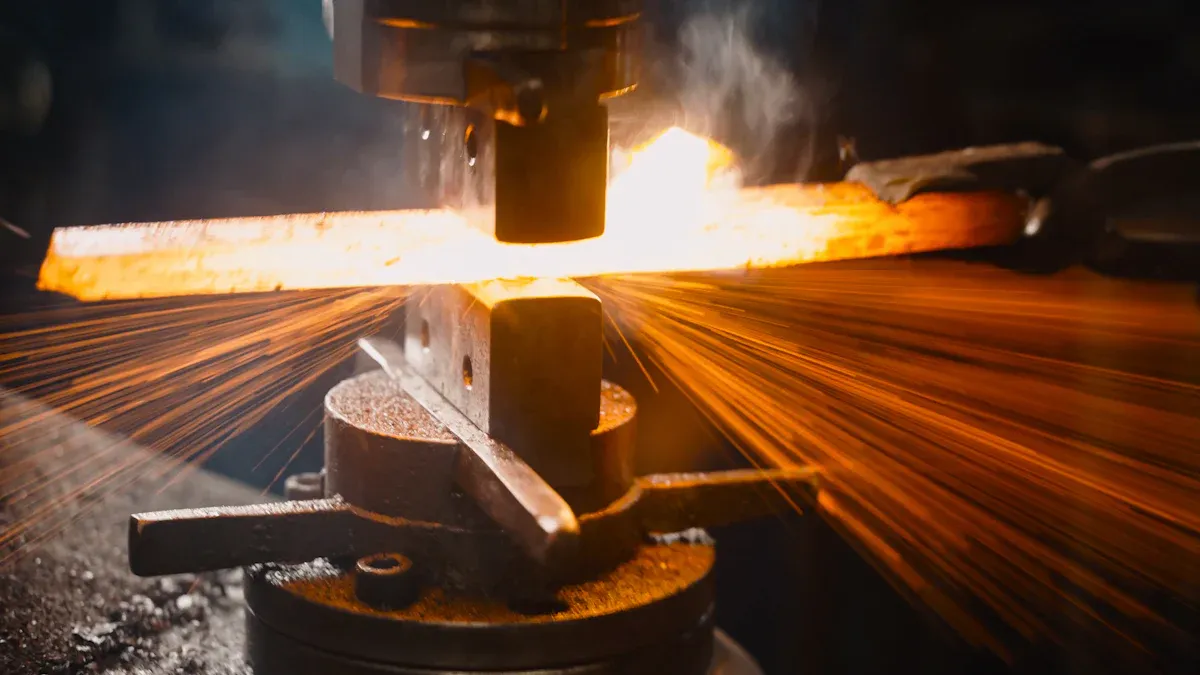
Comparison with Casting
Forging offers several advantages over casting, particularly in the maritime and offshore industries. The forging process compresses and aligns the metal’s grain structure, resulting in components with superior mechanical properties. In contrast, casting involves pouring molten metal into molds, which can lead to internal voids and inconsistent grain structures.
- Strength: Forged parts exhibit a yield strength up to 26% higher than cast parts. Forged steel achieves approximately 400 MPa, compared to 300 MPa for cast steel.
- Fatigue Resistance: Forged components endure up to 50% more fatigue cycles than cast counterparts, making them ideal for high-stress applications.
- Dimensional Accuracy: Closed-die forging achieves tight tolerances of ±0.3 mm, reducing the need for additional machining.
- Material Utilization: Forging exceeds a 90% material utilization rate, minimizing waste and lowering production costs.
These advantages make forging the preferred choice for critical shipbuilding and offshore applications, where strength and reliability are paramount.
Comparison with Machining
Forging and machining differ significantly in their manufacturing processes and outcomes. While machining involves cutting away material to achieve the desired shape, forging shapes metal through compressive forces. Each method has its strengths and weaknesses, as shown below:
| Manufacturing Process | Strengths | Weaknesses |
|---|---|---|
| Forging | Higher tensile strength, impact resistance, and fatigue life due to grain alignment. Efficient material usage with a utilization rate exceeding 90%. | Limited to simpler shapes compared to machining. |
| Machining | Achieves tight tolerances and superior surface finishes, making it ideal for applications requiring precision. | Higher material waste due to cutting away excess material. |
Forging provides unmatched strength and durability, making it the better option for components subjected to extreme stress, such as generator shafts in marine environments.
Cost-Effectiveness and Long-Term Value
Forging delivers significant cost savings and long-term value compared to alternative methods. Its high material utilization rate reduces waste, leading to lower raw material costs. Additionally, the superior strength and fatigue resistance of forged components minimize maintenance and replacement expenses over time.
The durability of forged parts ensures a longer service life, reducing downtime and operational disruptions. This reliability translates to lower total ownership costs, making forging a cost-effective solution for industries that demand high performance and efficiency. By choosing forged components, shipbuilders and offshore operators can achieve both economic and operational benefits.
Forged generator shafts remain indispensable for shipbuilding and offshore industries. Their unmatched strength, resistance to harsh environments, and ability to perform under extreme stress make them the ideal choice for critical applications.
- Key Benefits:
- Enhanced durability and reliability.
- Superior performance compared to cast or machined alternatives.
Investing in forged components ensures long-term efficiency and safety in demanding marine environments. By choosing high-quality forgings, industries can achieve operational excellence and reduce maintenance costs, reinforcing their commitment to sustainable and reliable maritime operations.
FAQ
What makes forged generator shafts superior to cast or machined alternatives?
Forged generator shafts offer higher strength, fatigue resistance, and durability due to their refined grain structure. Unlike casting, forging eliminates internal voids, and compared to machining, it ensures better material utilization. These qualities make them ideal for high-stress maritime and offshore applications.
Why are forged generator shafts essential for ship propulsion systems?
Forged generator shafts handle immense torque and bending loads, ensuring reliable performance in propulsion systems. Their exceptional strength and resistance to fatigue reduce maintenance needs, enhancing the efficiency and longevity of ships.
How does Rongli Forging Co., Ltd ensure product quality?
Rongli adheres to ISO 9001:2008 standards and employs rigorous quality control measures. These include chemical analysis, tensile tests, and non-destructive testing methods like ultrasonic and magnetic particle inspections. This ensures every product meets stringent industry requirements.
Can forged generator shafts withstand harsh marine environments?
Yes, forged generator shafts resist corrosion, fatigue, and mechanical failure in extreme marine conditions. Materials like stainless steel and alloy steel enhance their durability, making them reliable for shipbuilding and offshore operations.
What industries benefit from forged generator shafts?
Forged generator shafts serve shipbuilding, offshore oil and gas, renewable energy, and heavy machinery industries. Their strength, durability, and adaptability make them indispensable for applications requiring high performance under extreme conditions.
Post time: Mar-14-2025



